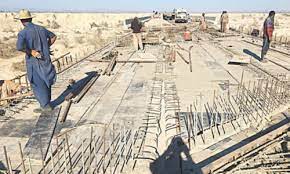SC wants speedy construction of overhead bridges, underpasses on KCR route
The Supreme Court directed the Sindh government to complete the PC-I, contract signing and issuance of work order for the construction of underpasses and overhead bridges on railway crossings falling along the proposed route of Karachi Circular Railway (KCR) within a month.
A three-judge bench headed by Chief Justice Gulzar Ahmed in its order issued on Thursday further told the provincial government that all requisite financial resources be made available to the Frontier Works Organization, tasked to execute the project, so that it could be completed as expeditiously as possible.
It directed the advocate general of Sindh to submit a report in this regard after a month.
In February last year, the SC had directed the Pakistan Railways to revive and operate the KCR within six months and also told the provincial government to build necessary infrastructure on the route to ensure that the KCR operation was not obstructed because of road traffic. In December the Sindh government had informed the Supreme Court that it had given a contract to the FWO for the construction of underpasses and overhead bridges.
When the SC took up the matter for hearing, Advocate General of Sindh Salman Talibuddin filed a report.
The FWO lawyer pointed out that the feasibility report of the project was approved by the railways and it was forwarded to the Sindh government, but neither PC-I had been approved nor any contract signed or work order issued. He further submitted that funds had also not been released yet.
The bench confronted Mr Talibuddin and asked him to explain why the needful had not been done despite repeated and categorical orders of the court in which the timeframe for the completion of the project was also given.
The Sindh AG contended that the FWO in consultation with the railways had changed the scope and tenor of the project and submitted a feasibility report which required certain portions of the route to be elevated and certain branch lines to be connected with the main line.
He further maintained that the Sindh government was funding the project and it would go beyond the financial commitment made by it before the court.
However, the same was contested by FWO 494 group commander Brig Waqar and he submitted that in light of the apex court orders, they had conducted a survey of the KCR route with experts and consultants and found that it was not possible in certain areas to construct underpasses and bridges and the most feasible way to operate the rail in such areas was to elevate the track in order to cause minimum obstruction to traffic.
He further argued that the overall cost of the project would remain the same with an added advantage of minimum obstruction of traffic and displacement of people.
When the bench asked chairman of Railways Habib-ur-Rehman if the railways had technically examined the FWO design, he categorically said that it was examined by railways experts and found the design to be compliant with all engineering and technical requirements, which would result in the smooth operation of the KCR for the entire length of the project.
He further said that there was no additional financial commitment required from the Sindh government other than what it had committed earlier.
The bench said that after hearing all it was clear that the revised design was feasible, technically sound and acceptable to all concerned and would be successful.
The maximum financial commitment of the provincial government in the sum of Rs6 billion would remain the same, it added.

